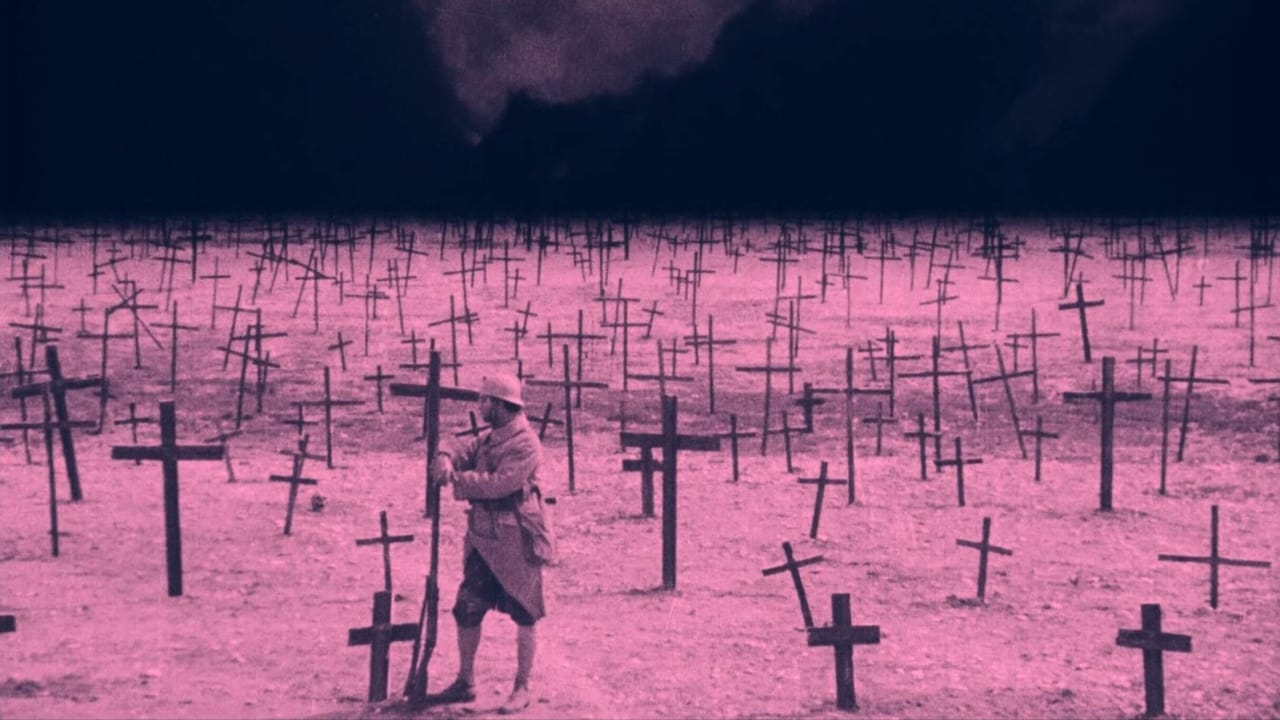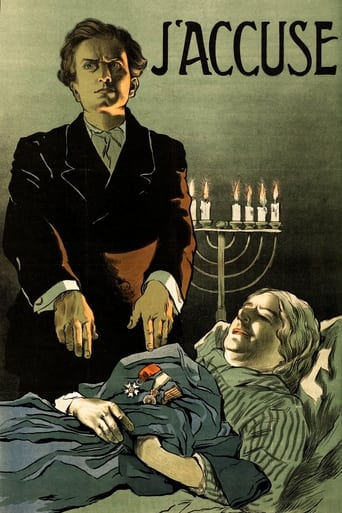

Wow! Such a good movie.
... View MoreWho payed the critics
... View MoreSorry, this movie sucks
... View MoreI didn’t really have many expectations going into the movie (good or bad), but I actually really enjoyed it. I really liked the characters and the banter between them.
... View MoreA truly underrated gem if ever there was one, J'Accuse, which comes from now renowned film-maker Abel Gance, is a striking, powerful and deeply moving wartime drama that packs punches, dances with the roses and howls at the moon all in the course of 160 minutes. Now known for works that came in the decade following the first World War, Gance establishes himself here in 1919 as a director willing to learn from his peers and do one better. Indeed, audiences at the time were more than firmly on his side. "Your name in England is, at present, more famous than Griffith's", an anecdote that rings true after watching J'Accuse in its most readily complete form available today thanks to the brilliant work in collaboration by Flicker Alley, Turner Classic Movies and Lobster Films in doing a terrific job restoring the film to its rightful, stylised beauty on DVD and Blu-Ray.Set, produced and featuring actual footage shot on battlefields of World War I, Gance's seminal work here strives to do many things at once and while there are plenty who will argue he tries too much (or at least doesn't leave enough on the cutting room floor), I argue that with a few minor exceptions, J'Accuse is successful in its quest to marry poetry with war and terror with beauty, with a horizon that never seems to show itself. Sure, it's certainly guilty of being a bit overly-lofty at times. And yes, cutting back and forth between the film's two heavily-contrasted plots can be jarring, but I hardly think this was out of step with Gance's intentions. The film's theme essentially boils down to the blind getting in the way of each other and those lucky enough to have eyes thinking it best to ignore said unfortunates in order to get on with their own problems or indulgences in peace. By applying the juxtaposition of a serene, idyllic French countryside love-triangle against the harsh, cold grasp of war and death, the director sets up his idea, carries it forward and succeeds in bringing it to a very affecting close.I would be amiss in failing to mention two other key players in J'Accuse's success however, and those are cinematographer Léonce-Henri Burel and the Robert Israel Orchestra who were commissioned for the restoration's soundtrack. Burel takes Gance's direction and runs with it. The battlefields are gloomy and frightening, the French countryside bright and warm to the eyes. Furthermore, whether it was under Burel's direction or not is unclear but, the film's various intertitle designs and abstract live-action imagery (the most striking perhaps occurring early on when family members prepare to leave their loved ones) make a profound emotional impact and showcase tonal photography techniques and styles not even Griffith had dreamed up yet, much of which is still utilised today in movies favouring mood and atmosphere. Lastly, the Robert Israel Orchestra punctuate Burel's photography with melancholic sweeping piano keys and piercing, wounded strings to round out one of the finest and most striking examples of silent-era cinema at its best.
... View MoreI don't watch silent films quite as often as I should, but this one reminds me I should try harder once more. Most praises I've read about (this one), go out to the third and final act, which is absolutely understandable, but I was very impressed with the hour and fifty minutes before that also. How the relationship between Jean and François changes was most impressively done, both by story and by acting (especially Séverin-Mars, who plays the latter, while Romuald Joubé deserves special credit for his part in act three, when he loses his mind).This war- and love-story works on many levels. It deals with the horrors of war, but also how man (and woman and child) can overcome - though obviously not without scars. The part of the child that was conceived through rape is especially harrowing, but the love of Jean and Edith helps even the raging soldier François to gain understanding of true love - though the scene in which the child must play a German soldier with the French kids is again hard to watch.The words 'J'accuse' return many times in the film, but who is really accused in the first part of the film? The war ministers in their safe retreats, one would say? When we witness one them being struck personally by a (war) tragedy, we must conclude no. The words 'I accuse' are more likely the perfectly logical way of expressing one's desire to blame someone - anyone - for all miseries that may come about in life; in war, ánd in love. When finally Jean looks out his window and blames the sun, this seems to substantiate that idea; it is an angry, desperate rant against a 'thing' which will burn no less when it is addressed. Of course I do not mean to dismiss here the part just before that, in which the returning dead army ghosts accuse their close ones of betrayal in various ways, but their accusations are instantly cathartic to all, and both the survivors and the dead may carry on. So, I'd like to doubt the reviews I've read about this film being anti-war, Abel Gance 'simply' seems to say that horrors of these kind had better be worth the while...? Just my two cents after this first viewing.Then there is an owl (symbol of the night) who acts as the prophet of war, someone resembling 'Astérix le Gaulois' as a symbol of bravery on the side of the French soldiers, beautiful visualizations of a book of poems called 'Les pacifiques', and so on. I can't say I fully understood all of it, but I did enjoy pretty much all of it; who is then really bothered when someone looks into the camera now and then (accidentally, I presume) or when there seem to be some wrongly cut short bits here and there (again, accidentally, I presume)? And, perhaps strangely, but it worked somehow, there is room for some humourImpressive, to say the least. A big 8 out of 10.
... View MoreWith this movie full of stunning imagery and stylish technique Abel Gance proved that he need take a back seat to no one when it came to mastery of the medium, in other words he forms a triumvirate with Sergei Eisenstein and David Wark Griffith, a triumvirate in which all are equal. The First World War was barely cold in its grave when Gance shot J'Accuse - a motif that recurs throughout from the visually stunning message spelled out by infantry at the outset to the child being taught to write it on a blackboard - yet remarkably what should now seem 'dated' is still potent - seventeen years later Irwin Shaw (who may or may not have seen or been aware of J'Accuse) utilised the concept of the dead protesting at the way in which their lives were squandered in his powerful One-Act play 'Bury The Dead' - and aspects of it were re-worked by others. Like most fine social documents it employs a 'normal' story - in this case our old friend the Eternal Triangle - as a way in to the exploration of political inadequacies and its message still resonates some 87 years later. A Masterpiece.
... View MoreIn connection with the showing at this German Count's private cinema of the film "Mater Dolorosa" (1917) by Herr Gance some months ago, this Teutonic aristocrat had praised and even eulogized the good film work of this important and essential French film director. "Mater Dolorosa", with its superb cinematographic technique, was a great definitive leap forward in Herr Gance's career."J'Accuse!" confirms aristocratic suspicions about Herr Gance's ability. Because it's without any doubt another great film in which those pioneer cinematographic techniques mentioned before are carried out. Again an excellent example of technical experimentation to achieve a film narrative, J'Accuse is superbly developed achieving an unquestionable masterpiece."J'Accuse!", besides it's perfect technique, is an emotive antiwar message filmed during the I World War great disaster and with wounds still open. It's a film that denounces the absurdity of war, its uselessness and the terrible consequences that society suffers. It demands the viewer to take note of the great sacrifices and injustices of many broken lives that never will be the same through the fault of the war.And now, if you'll allow me, I must temporarily take my leave because this German Count when mentioning those old wars plenty of lost battles, is slightly Teutonic.
... View More